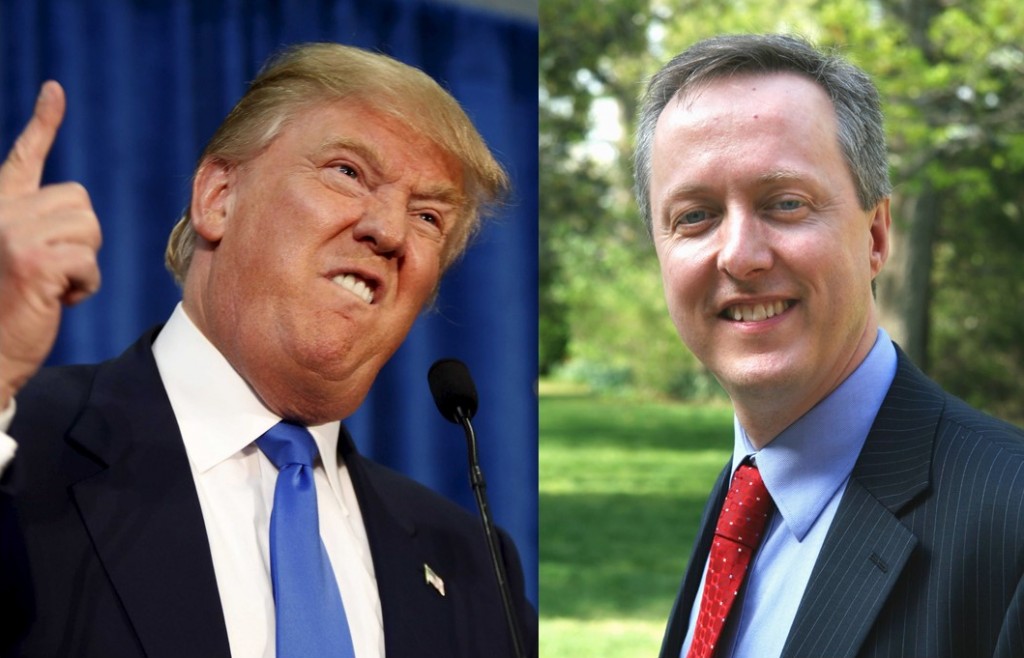by Ian Markham
The conventional hypothesis is that Mr. Trump’s success is due to the anger of the Republican base. In response, every candidate has tried to relate to the “anger” of the base. Their messaging has been “we understand your anger, just don’t vote for Donald Trump”. But perhaps we are being too kind: perhaps we have an uglier and more disturbing phenomenon here.
Others (such as Warren Buffett) have made the point that there isn’t any reason for the Republican base to be so angry. When we look at the facts, unemployment is at 4.9%; gas prices have fallen dramatically; inflation is virtually invisible; and we are outperforming by far the other major economies in the world. Add to this picture other recent recessions. George Bush had two recessions on his watch and only added 1.3 million jobs, while Barack Obama has added 9.2 million jobs. If the base wanted to be angry, then 2008 or 2012 would have made more sense.
So if the economic data is OK, then why? Four main theories have emerged. First, there is the slow recovery hypothesis. This is the line of the opinion pages of the Wall Street Journal. This recovery has been frustrating slow, they argue. Although it is true that the recovery has been patchy, it is important to remember that compared to the rest of the world this has been the strongest recovery out there And compared to the Bush years, this has been an OK recovery.
In the pages of The Economist, we find the second theory. The inflamed base hypothesis argues that Republican political leaders in response to the Tea Party allowed their rhetoric to become excessive. An angry base found a mirror in the Republican leadership which created an ever more angry base. However, this hypothesis does not explain Donald Trump. Donald Trump does not reflect back the prejudices of the base. He flirts with higher taxes for the rich; he supports the mandate; and he is only recently become pro-life. He isn’t an angry inflamed base writ large.
A more historical line comes from those defenders of the ultra partisan division – theory three. So Algernon Austin, writing in the Huffington Post, takes this line. We have two Americas, with two electorates who see the world in completely different ways. Democrats worry about healthcare, but not deficits; Republicans worry about the deficit, but not healthcare. For those taking this line, the emergence of Trump is just the logical outcome of decades of growing partisanship and the disappearance of moderates and independents. Again, this hypothesis does not explain Trump. He is utterly maverick on his political positions. And some Democrats are supporting Trump.
Theory four is from Ross Douthat. He suggested the decadent hypothesis. He concedes that the data shows an OK America. The state of the Union might not be fabulous, but “it could clearly be a whole lot of worse”. For Douthat, Americans don’t want “it could be worse”, they want to be able “to advance in the way that its citizens once took for granted”. He believes that Americans are rebelling against the steady decline of this excessively successful nation (hence the decadent hypothesis).
Douthat might be on to something. Trump is pure rhetoric; and Republicans like the tone. They don’t want a realpolitik to shape foreign policy, they hanker for an age when “America just bombs its enemies out of existence”. Trump promises a great America; one where people are all speaking English “again”. The lack of clarity around policy implementation is fine: the tone is what they love.
But there is more going on. There is a revolt against ‘political correctness’. Let me be clear: when attacking political correctness is an excuse to flirt with David Duke, attack Latinos and Muslims, and denigrate women, then that is wrong. The delightful phenomenon marked by the election of Barak Obama in 2008 was the reversal of the ‘Bradley effect’. Obama won by a bigger margin than anticipated because people wanted to be part of the election of the first African American President. This spirit has completely dissipated. For Trump, being “anti-political correctness” is code for the freedom to be ugly. “Muslims should be banned from America”; “Latinos should be sent home”. “This reporter has a disability”. “She is a slut”. This is the language of Trump. Trump is providing license for people to utter what was beyond the bounds of civility.
Trump is wrong because intemperate language against women, immigrants, the disabled, and Muslims is an act of sin. Our civic discourse should always be elevated. In the privacy of our home, late at night, after a drink or two, our discourse might be less than precise and virtuous (not that it makes it right, but it happens), but our civic discourse is public and words have an impact. We should always recognize that when we talk about human lives we are talking about men and women who are made in the image of God. People are of infinite value. This debased and coarse language is totally inappropriate; in fact, it is wrong; it is sinful; indeed it is evil.
The Episcopal Church has a role to play. What is needed is for commentators who are responsible for protecting the Public Square from the language of oppression to be a little less understanding with the anger that Americans are feeling. Much like teenage children, there might be legitimate triggers for angst, but the enthusiasm for Donald Trump is wrong. America is “acting out”. America can live with pluralism; it has done it well in the past and can do it well in the future. The Episcopal Church should start saying, loud and clearly, “stop this tantrum and grow up America”.
Ian S. Markham is the Dean and President of Virginia Theological Seminary

